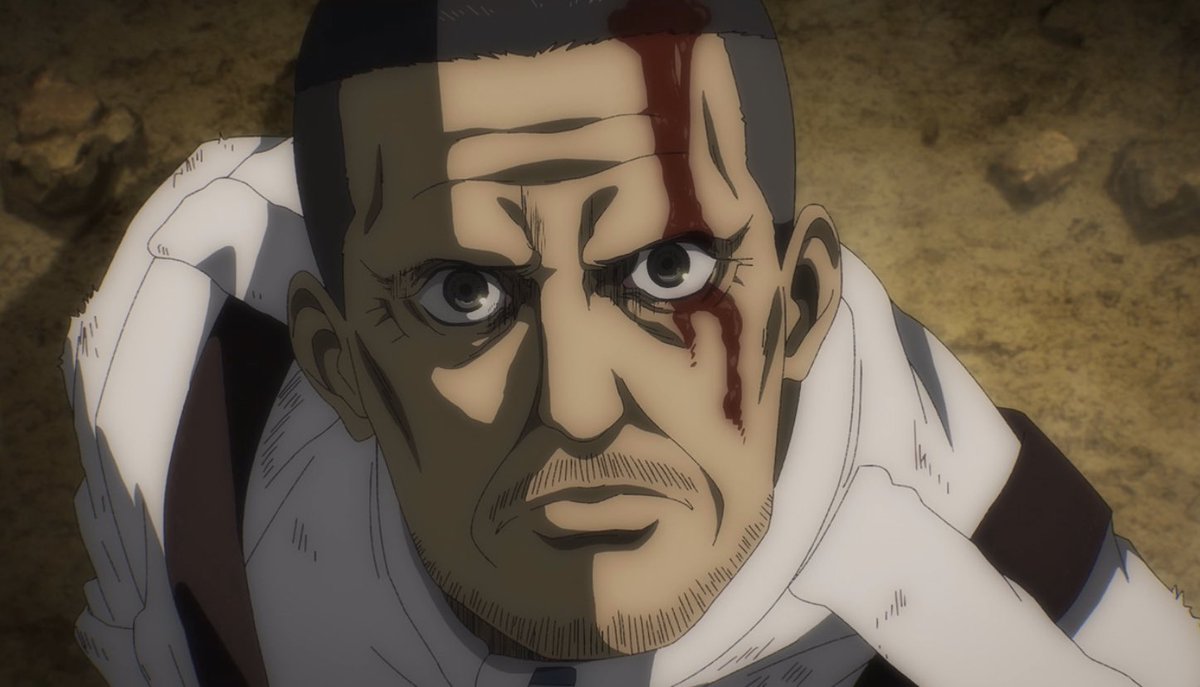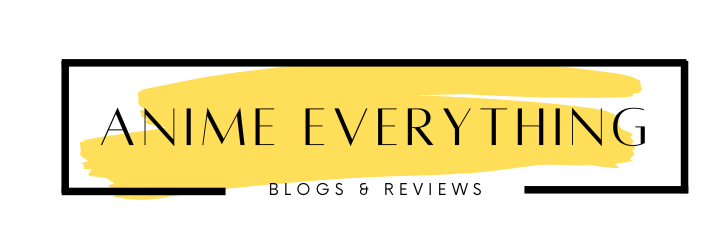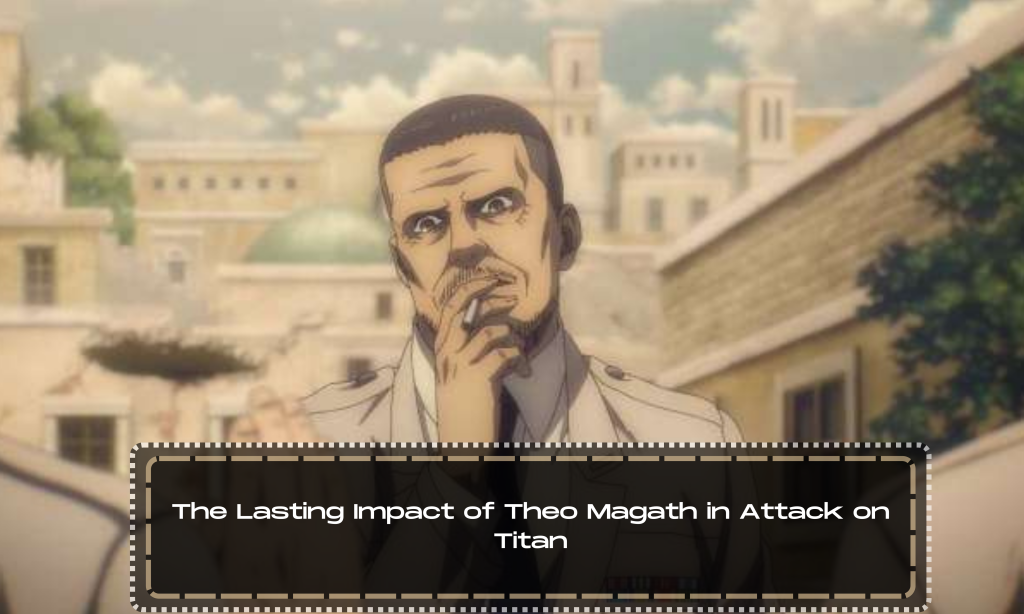The Lasting Impact of Theo Magath in Attack on Titan

From the start of Isayama’s extremely bold move to introduce an entirely new cast two-thirds into his story, it’s crystal clear that Theo Magath is different from what one would expect from a Marleyan official. Outwardly, he says all the things one would expect him to, but it is in between those barked orders in the first couple of episodes where we can see that he just isn’t cut from the same cloth as those around him.
The way he is open to listening to the plan of a mere warrior candidate in a desperate situation, the way he allows them to celebrate on the train home, the way he looks on with silent curiousity during the tragic yet beautiful scene of the kids he’s brought up as soldiers reuniting with their families.
With the context of his character in mind, one could even interpret him telling a young Zeke that he wasn’t suited to being a warrior as an act with a hidden motive of leading this child away from a life of misery and blood.
And at the end of his life, he himself exclaims what is already made pretty clear through these little touches. That the things he did went against his morals and he never felt right doing them, but he convinced himself through established dogma to do them anyway. Because that made it easy, and because that’s what he knew.
Let me be clear – I am not saying that this makes Magath a good person. Actions define people in these situations, not subtext, and Magath’s actions perpetuated a horrific cycle and directly contributed to the indoctrination and creation of child soldiers. As the story and he himself state, having a conscience and doing these things anyway is absolutely nothing to be proud of, and it doesn’t absolve him of anything.
But it does make him an immediately rich character and it does give him the stimulus and potential for a great arc, which Isayama definitely followed through with. Initially, Magath checks all the boxes for someone who knows deep down that all of this isn’t the right path, but doesn’t do anything about it. He is in a difficult position without a doubt, but regardless, he put himself in that position and he is part of a problem early on.
He spouts nationalistic rhetoric, he trains children dogmatically, he heads missions that use them as nuclear weapons, tools and assets for Marley’s cause and the whole Honorary Marleyan culture remains strong thanks to people like him and the way in which history pushes him on. But as we know, he does it somewhat reluctantly, burying his outcries through convincing himself of convenient half-truths to not face the uncomfortable reality.
All of what he’s doing here isn’t reflective of who he is at heart. And yet, he did it anyway. So he is defined by what he did here, and he had to live and die with that on his conscience. He is more than authority, or would like to be more than authority to these young people.
He cares for them, he wants more for them, his position as cold unfeeling dogmatic commander to them just doesn’t quite fit him and he doesn’t enjoy it at all, nor does he really stop to critically think of the war and his role in it. But he does these things anyway. At first. And yet, despite this, Magath’s lasting impression on the world was far more than what he laid down through his position as a cog in Marley’s system.
To me, one of the great joys of this story is seeing characters ultimately become open to differing perspectives despite being taught to think a certain way their whole lives, and becoming more open, empathetic and compassionate as a result.

We see it with characters like Gabi and Reiner, and Magath learns very similar things. He stifles himself, but seeing him break out of the position he had burrowed himself into is absolutely wonderful and the little lines and significant glances here and there were hints that he had this capacity in him from the start.
Whether it be in reaction to Willy Tybur’s extreme plans or just as something that built in the back of his mind as time went on, Magath distinguished himself through not viewing Marleyans as some sort of exception. He viewed the symbol of Helos as hollow and ultimately concluded that a proper and different, true one was needed, and he states outright here that through the things that both sides do and have done in service of this conflict, everyone is a devil with no exceptions.
But the nuance in this statement that he misses here is that it isn’t a foregone conclusion that everyone is a devil.
Everyone has the capacity and potential to be a devil. But if one can find it within themselves to transcend the shackles and roles placed upon them, it need not be so. And as a result, we need not assume others to be devils just because it’s what we’ve grown to expect from them. We must instead learn about them and be compassionate and understanding, because that is the only way forward.
Being confronted with Liberio getting completely decimated and more importantly, the possibility of losing these people he cares for and is responsible for is what kickstarts Magath’s turnaround. It’s much harder to keep up masks and pretenses when stakes are at their highest, and so we see the true person Theo Magath is at heart reveal himself here as he takes his first steps.
And essentially what this all comes down to is him dropping the role of the cold military leader and instead looking at the younger people as .. humans. It’s a low standard to set, I’m aware, but the strength of his care here is nonetheless quite moving.
This is how he’s always felt all along – he just hadn’t shown it. And we can see this just through his actions in defending and caring for the safety of these people, but also through how his use of names evolves throughout the series. One of the defining traits of Magath that illustrates the type of person he is early on is how he would only ever refer to the warrior candidates by their last names, or by the title of Eldian as he would often remind them of the past atrocities and how they echo throughout history.
It was very cold, pragmatic and impersonal, and very much in line with his role as a Marleyen cog. But what’s notable is that he didn’t do this ALL the time to everyone – for instance, he refers to Colt by his first name in the middle of the battle with the Mid East forces, and Zeke by first name later on, and tells everyone to protect Pieck, not the Cart, when she is injured.
It seems that when the person in question was of a comparatively higher rank, he felt compelled to refer to them by first name, much more intimately, due to having a bit of an excuse. But with stakes at their highest, he foregoes this and yells at, and I quote, Gabi to get down to dodge an attack. And this was a precursor to the major change that would occur after the Liberio Invasion.
Because when he is reunited with Gabi during the Shiganshina invasion after not seeing her and Falco for what seems like forever, the first thing he does is call her by her first name and take her in an embrace, clearly showing how much he cares and how worried he was. And from this point on, he almost exclusively refers to all of them by their first names.
But outside of his blossoming connection and attachment to his warriors and the way in which he expresses that, another key element to Magath is his overall perspective and attitude towards this conflict. During the campfire dialogue, he initially poses quite an antagonistic figure towards Hange, Jean and the rest of the 104th.
And you can see where he’s coming through telling them that the rumbling occurring is proof that the Marleyans were viewing the situation accurately – but nonetheless he still has a huge blind spot that dismisses the suffering inflicted upon those he opposes in a much more personal way than he has ever tried to think about – again, likely due to it being an uncomfortable truth.
He doesn’t look at these people as people, and he doesn’t attempt to see their perspective openly. But his pupil who had been formerly indoctrinated opens the way for him through prostrating herself and BEGGING for cooperation to stop this.
Magath sees Gabi in such misery and hopelessness, and he reaches out for her to try to comfort this girl that he cares about – but in this situation, what could he possibly say to make things better, after what he had done to put up the walls that she had tried to break down here? And so he stops, humbles himself, and resolves to instead look at these people as people – not as devils, not as enemies.
He apologizes for the oncoming onslaught that will hurt and kill many of their friends, and .. he calls them by name. ANd I don’t need to repeat the significance of that. And as we discussed, he finally expresses something that he had been feeling, but not acting on, all along. And he brings it into the light. He had done things that left tragic marks on history that cannot be forgiven.
He has dismissed and handwaved the immense suffering of Jean, Connie, Armin, Mikasa and Hange. And he can’t change that. But what he can do is express his understanding and empathy now, and vow to work together with the goal of stopping this mess in mind.
It’s that bigger picture thinking that puts aside history and differences to work together in service of doing what one believes is right. Magath chastises himself for going with the flow and for not speaking up despite his own hesitance.
And he’s right. He perpetuated this, and he likely feels complicit in longer-reaching ways as well, as he reflects on Zeke when thinking about those he wanted to have happy lives, showing that despite the betrayal, Magath personally bears a significant portion of the blame for how he turned out as well.
But as I’ve said a couple of times now – actions define people. Through Gabi, he saw the things he had valued buried underneath manifesting in someone who had chosen to defy that flow. And he bears the responsibility that someone like him must bear to progress things in that direction.

Like Mr Braus says, it is the adults that must take the brunt of responsibility to break this cycle – through forgiveness, compassion, empathy, understanding, letting things go, and seeing that improbable world in the distant future for those that will continue forward in their wake.
Unfortunately, it is impossible for the children to stay out of the forest and keep their hands clean given the situation. But nevertheless, his sacrifice along with Keith here is one that, while not getting them out of the forest, offers a stepping stone to allow for that to be an eventual possibility. Eyes fully open, he sees what he must do and has no hesitation in doing so.
Previously, he acted against his heart and had perpetuated this awful cycle and customs, and he owns up to that – finally doing this not for Liberio or for Marley, but for the bigger picture, for the world, for saving the lives of people he doesn’t know so that his students can live happily.
And while he lingers on his regrets, he is encouraged by a fellow leader in Keith, who can offer some solace and pride for what he is about to do when he cannot muster any for himself. And in thinking of the possibility for a future for those he cares for, in knowing that this act will help them.. Magath allows himself a small smile in spite of it all, a tiny bit of pride.
He was never a good man, but in this moment, his act here is completely true and reflective of his heart and who he truly was all this time, as much as he was lead astray.
And his lasting impact will never be forgotten. It may get lost in the annals of history, but those whom he did it for would never allow themselves to forget. Many thanks for reading.
That’s me, Andreea Blaga, author of the blog anime-everything.com. I work as a content creator in the US. I am also passionate about Japanese Anime.


Related post
Character Study: Korra and Aang’s Legacy
In the richly woven tapestry of the “Avatar” universe, the characters of Korra and Aang...
Jul
Islands of Wonder: Exploring the Unique Geography of One Piece
Enter the vibrant world of One Piece, a beloved manga and anime series created by...
Jul
Unveiling ‘The Eminence in Shadow’: A Dive into its Intriguing Premise
“The Eminence in Shadow” is a light novel series written by Daisuke Aizawa and illustrated...
Jul
Dragon Ball Z: A Cultural Phenomenon Through the Ages
Since its debut in 1989, “Dragon Ball Z” has become a cultural phenomenon that transcends...
Jul
Unleashing the Chainsaw: A Deep Dive into Chainsaw Man’s Gripping Plot
In the realm of dark fantasy manga, few series have captivated readers quite like Tatsuki...
Jul
Aang’s Journey: From Reluctant Hero to Avatar of Peace
In the world of animated series, few have captured the hearts and minds of viewers...
Jul